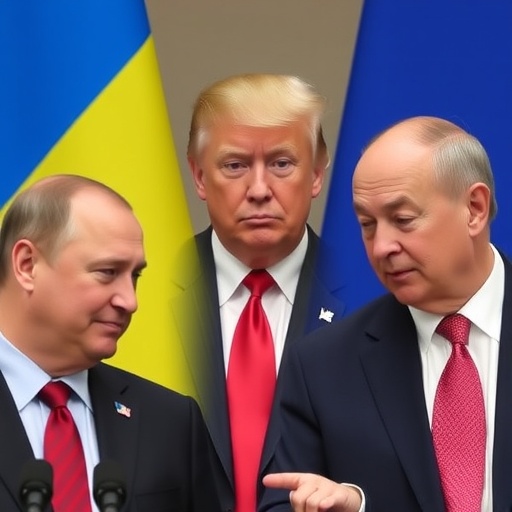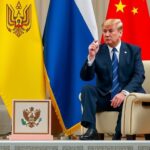Trump Cancels Putin Summit, Urges China to Mediate Ukraine Peace Deal Amid Escalating Tensions
In a stunning diplomatic pivot that has sent shockwaves through international circles, former President Donald Trump has abruptly called off a highly anticipated summit with Russian President Vladimir Putin, declaring he will not engage in direct talks until a concrete peace deal is secured in Ukraine. Instead, Trump is calling on China to step up as a pivotal mediator, highlighting Beijing’s unique position to influence Moscow and facilitate an end to the protracted conflict that has ravaged Eastern Europe for over two years.
- Trump’s Ultimatum: No Summit Without Ukraine Peace Progress
- China’s Rising Role: From Economic Partner to Potential Peacemaker
- Global Reactions: Allies and Adversaries Weigh Trump’s Diplomatic Gambit
- Ukraine’s Battlefield Realities Fuel Urgency for a Peace Deal
- Pathways Forward: Navigating Challenges Toward Ukraine Resolution
The announcement, made during a fiery speech at a campaign rally in Florida on Thursday, underscores Trump’s aggressive approach to foreign policy, blending his signature bravado with a strategic outreach to an unlikely ally. “I’m not sitting down with Putin until there’s peace in Ukraine—no more games, no more delays,” Trump proclaimed to a cheering crowd. “China has the leverage with Russia that no one else does. It’s time for President Xi to make the call and get this peace deal done.” This move comes as the war in Ukraine enters its third year, with over 500,000 casualties reported by the United Nations and economic ripple effects felt worldwide, including soaring energy prices and disrupted global supply chains.
Trump’s decision marks a significant escalation in his post-presidency influence on U.S. foreign affairs, especially as the 2024 presidential election looms. Sources close to the former president indicate that preliminary discussions for the Putin summit had been underway through backchannels for months, but recent battlefield developments—such as Russia’s stalled advances in the Donbas region—prompted the cancellation. By shifting focus to China, Trump aims to leverage Beijing’s deep economic ties with Russia, including billions in trade that have sustained Moscow’s war machine despite Western sanctions.
Trump’s Ultimatum: No Summit Without Ukraine Peace Progress
Trump’s cancellation of the Putin summit is more than a scheduling change; it’s a calculated ultimatum aimed at pressuring Russia into concessions. In his rally speech, Trump detailed his rationale, citing intelligence reports of Russian troop buildups near Kharkiv as evidence that Moscow is not serious about negotiations. “Putin thinks he can drag this out forever, but not on my watch,” Trump said, emphasizing that any future meeting would require verifiable steps toward a peace deal, such as a ceasefire along the current front lines or the withdrawal of Russian forces from occupied territories in Ukraine’s Kherson and Zaporizhzhia regions.
Diplomatic insiders reveal that the planned summit was intended to occur in a neutral location, possibly Geneva, Switzerland, echoing the format of previous U.S.-Russia talks. However, Trump’s team cited a lack of progress in indirect talks mediated by Turkey and Qatar as the breaking point. According to a recent report from the Institute for the Study of War, Russian forces have made minimal gains since January 2023, losing an estimated 120,000 soldiers in the process, which Trump argued provides a window for diplomacy—if Putin is willing.
This stance aligns with Trump’s long-held view that the Ukraine conflict could have been averted under his administration. He frequently references his 2019 Helsinki summit with Putin, where he claimed to have established a personal rapport that could now be weaponized for peace. Yet, critics within the Republican Party, including Senator Lindsey Graham, have expressed skepticism, warning that alienating Putin outright could harden Russian resolve. “Trump’s tough talk is good, but we need allies on board,” Graham told reporters, highlighting the delicate balance between pressure and isolation.
Economically, the implications are stark. The war has driven up global wheat prices by 30% since 2022, according to the World Bank, exacerbating food insecurity in Africa and the Middle East. Trump’s push for a swift resolution ties into his domestic agenda, promising voters relief from inflation tied to the conflict. By conditioning the summit on peace, he positions himself as a decisive leader, contrasting with what he calls the Biden administration’s “weak” handling of the crisis.
China’s Rising Role: From Economic Partner to Potential Peacemaker
Turning to China for mediation represents one of the most intriguing aspects of Trump’s strategy, given the historically tense U.S.-China relations during his presidency. Trump, who imposed tariffs on billions in Chinese goods, now sees Beijing as an indispensable player in forging a Ukraine peace deal. China’s close relationship with Russia—evidenced by a 2023 trade volume exceeding $240 billion, per Chinese customs data—gives it unparalleled sway over Putin’s decisions. Xi Jinping’s declaration of a “no-limits” partnership with Moscow in February 2022 has drawn Western ire, but Trump argues it can be redirected toward constructive ends.
In recent weeks, Trump has reportedly reached out to Chinese officials through intermediaries, urging a trilateral framework involving the U.S., Russia, and China. “China wants stability; they don’t want this war dragging on any more than we do,” Trump stated in an interview with Fox News. This outreach builds on China’s previous diplomatic forays, such as its 12-point peace plan for Ukraine proposed in February 2023, which called for respect of territorial integrity but stopped short of condemning Russia’s invasion. While dismissed by Kyiv as pro-Russian, the plan garnered quiet support from Global South nations wary of Western dominance.
Experts believe China’s motivation lies in its own geopolitical ambitions. As the world’s second-largest economy, Beijing faces pressure from U.S. sanctions on Russian oil purchases, which have indirectly boosted China’s energy imports but also exposed it to secondary penalties. A successful mediation could enhance China’s image as a responsible global power, countering narratives of expansionism in the South China Sea. “If China brokers a deal, it could reshape the international order,” said Dr. Elena Chen, a China-Russia relations specialist at the Brookings Institution. “Trump’s invitation is a pragmatic acknowledgment of this shift.”
However, challenges abound. Ukraine’s President Volodymyr Zelenskyy has been vocal about excluding Russia-friendly mediators, stating in a recent CNN interview, “We need guarantors who stand with us, not those buying Russian oil.” Public opinion in China, shaped by state media portraying the war as a NATO provocation, may also resist deeper involvement. Despite these hurdles, Trump’s overture could catalyze quiet diplomacy, with reports of upcoming U.S.-China talks in Singapore next month.
Global Reactions: Allies and Adversaries Weigh Trump’s Diplomatic Gambit
The international community has responded with a mix of intrigue and caution to Trump’s announcement. In Europe, NATO allies like Germany and France have welcomed the emphasis on peace but expressed concerns over bypassing established channels. French President Emmanuel Macron, speaking at the Munich Security Conference, noted, “Any initiative that ends the suffering in Ukraine is valuable, but it must include all stakeholders, including the EU.” The European Union has pledged over €100 billion in aid to Ukraine since 2022, making it a key player whose exclusion could undermine efforts.
In Washington, the Biden administration has downplayed Trump’s role, with White House Press Secretary Karine Jean-Pierre stating, “The U.S. leads on Ukraine through multilateral coalitions, not solo campaign promises.” Yet, behind the scenes, there are signs of alignment; U.S. diplomats have echoed calls for China’s constructive engagement in UN Security Council debates. Russian state media, meanwhile, has lambasted the cancellation as American arrogance, with Kremlin spokesman Dmitry Peskov claiming, “Putin is always open to dialogue, but not under ultimatums.”
Ukraine’s reaction has been measured. Zelenskyy, in a Telegram post, appreciated the focus on peace but stressed the need for security guarantees in any deal. “Trump’s words are bold, but actions matter—Russia must withdraw first,” he wrote. Non-Western powers, including India and Brazil, have praised the inclusive approach, with Brazilian President Lula da Silva offering to co-mediate. A recent Pew Research poll shows 62% of Americans support diplomatic solutions involving China, reflecting war fatigue after $175 billion in U.S. aid to Ukraine.
Security analysts point to potential flashpoints. If China engages, it could strain U.S.-India ties, given New Delhi’s neutral stance. Conversely, a failed mediation might embolden Putin, leading to intensified cyberattacks or hybrid threats against NATO borders.
Ukraine’s Battlefield Realities Fuel Urgency for a Peace Deal
The urgency of Trump’s intervention cannot be overstated amid the grim realities on the ground in Ukraine. As of March 2024, the conflict has displaced over 6 million Ukrainians, according to UNHCR figures, with cities like Mariupol reduced to rubble and infrastructure damage estimated at $400 billion by the World Bank. Russian missile strikes continue, with a recent barrage on Odesa killing 12 civilians and disrupting Black Sea grain exports critical to global food security.
Trump’s rhetoric draws on these horrors, invoking images of bombed-out schools and orphaned children to rally support. He has pledged that a peace deal under his influence would include reconstruction aid, potentially funded through seized Russian assets totaling $300 billion frozen in Western banks. Military analysts from the RAND Corporation report that Ukraine’s counteroffensive has reclaimed 50% of occupied territory since 2022, but at a high cost—losses of advanced Western weapons like HIMARS systems have strained supplies.
Putin’s perspective adds complexity. In a state media address last week, he reiterated demands for Ukraine’s demilitarization and recognition of Crimea as Russian, conditions Kyiv deems non-starters. Trump’s exclusion of these until peace progresses could force a rethink, especially as Russia’s economy grapples with 7% inflation despite wartime spending.
Civil society in Ukraine remains resilient, with grassroots movements pushing for justice. Organizations like the Ukraine Crisis Media Center have documented war crimes, ensuring any peace deal addresses accountability through bodies like the International Criminal Court.
Pathways Forward: Navigating Challenges Toward Ukraine Resolution
Looking ahead, Trump’s diplomatic maneuver opens several pathways for a Ukraine peace deal, though obstacles remain formidable. Immediate next steps could include virtual talks between U.S. and Chinese envoys to outline mediation principles, potentially expanding to include Ukraine and the UN. Success hinges on mutual concessions: Russia easing territorial claims, Ukraine accepting neutral status, and China pressuring for de-escalation.
If realized, such a deal could stabilize global markets, reducing oil prices by 20% as projected by Goldman Sachs and averting a humanitarian catastrophe. Failure, however, risks prolonged stalemate, with experts warning of nuclear saber-rattling from Moscow. Trump’s involvement, while controversial, injects urgency into a process bogged down by bureaucracy. As negotiations unfold, the world watches whether this unorthodox alliance of Trump, Putin, and China can deliver the peace Ukraine desperately needs, reshaping alliances for decades to come.
In the broader geopolitical landscape, this shift signals a multipolar world where traditional foes collaborate on shared crises. Stakeholders from Kyiv to Beijing must now decide if diplomacy’s window remains open, or if the drums of war will drown out calls for peace.







